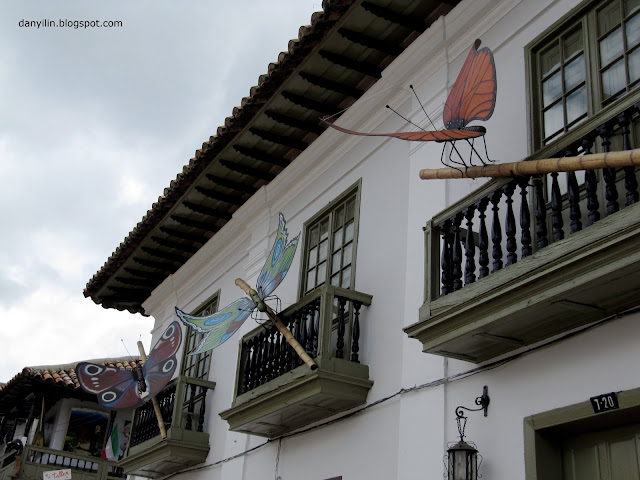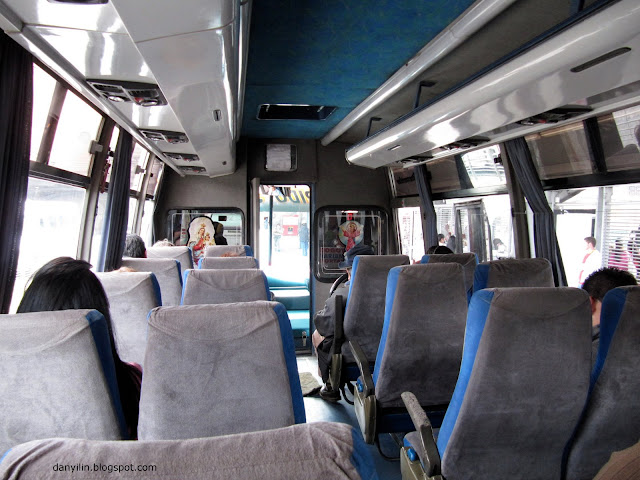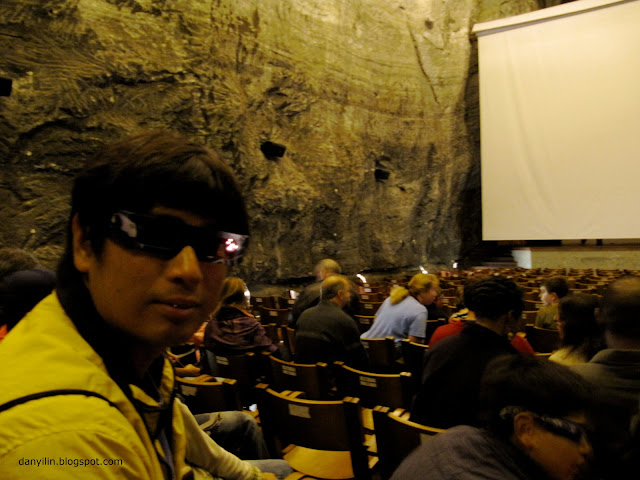On one of the weekends in Bogota, we made a day trip to Zipaquira to visit La Catedral de Sal - literally "the Salt Cathedral". Together with our new Taiwanese friend, Vincent, we embarked on the first leg of the journey - a 40-minute ride on the Transmileno.
The Transmileno is said to have revolutionised Bogota's public transport system. It's pretty much like our MRT back home, except that instead of overhead or underground tracks, the Transmileno buses run along designated lanes (a bit like our bus lanes) and instead of trains, passengers ride on bendy-buses. It costs COP 1,500 (approx US$0.75) per trip, regardless of time or distance traveled.
The Transmileno bus-stops are not like anything we've seen before. They function like bus terminals where there are designated boarding points for different bus services, but are built like MRT stations, complete with platforms and sliding doors.
The hardest part of taking the Transmileno is figuring out the transport map. Although it initially looks less intimidating than the complex tangle of coloured lines representing the New York City subway or the London Tube, Bogota's version requires alot more brain cells to be sacrificed in deciphering the colour codes. After getting incredibly lost on our first ride, we managed to decode the mass of colours and now move around town confidently on the Transmileno. Sometimes more so than the locals (who have, on occasion, asked us where to drop off.)
 Meeting Vincent made us effectively multilingual - learning Spanish while conversing in English, Mandarin and a smattering of Hokkien.
Meeting Vincent made us effectively multilingual - learning Spanish while conversing in English, Mandarin and a smattering of Hokkien.  View of Bogota's city streets from inside the Transmileno. Picture taken by the Canon SX200 in "colour accent" mode. Muy cool.
View of Bogota's city streets from inside the Transmileno. Picture taken by the Canon SX200 in "colour accent" mode. Muy cool. At Bogota's Porte de Norte, we searched amongst the hoards of inter-city buses and hopped onto the one marked "Zipa" - short for Zipaquira. The inter-city bus was much older than the Transmileno and looks more like a (non-airconditioned) coach, costing COP 3,400 (approx US$1.70) for the hour-long ride. Halfway through the trip, a conductor comes around to collect the fare and peanut vendors come onboard to hawk their wares.
Zipaquira was abuzz with activity, it being the long holiday weekend to mark Colombia's Independence Day the following Monday. We walked up a lovely pedestrian mall lined with shops, towards the salt mines.
Cresting the first stretch of the hillside, we found ourselves in a large town square. Although the salt mines are suppose to be a short 15-minute walk from the bus stop, we found ourselves taking much longer as we kept stopping to take in the sights (especially the local food!) and to soak in the festive atmosphere.
 The Colombians in Zipaquira have quite a sense of humour when choosing decorations for their building facades. Giant butterflies here...
The Colombians in Zipaquira have quite a sense of humour when choosing decorations for their building facades. Giant butterflies here... Stopping, gawking and snapping every few steps. The expression on my face tells Dan that he's taking way too many pictures here.
Stopping, gawking and snapping every few steps. The expression on my face tells Dan that he's taking way too many pictures here. Lost in the hustle and bustle of the marketplace, we strayed too far from the turn-off towards the salt mines and once again, got lost. Stuttering in broken Spanish, we managed to ask one of the locals which direction we should be heading in. Gesturing madly, with grand sweeping motions towards the right of the town square, he repeated "Zooooosshhhh, deracha (to the right)!! Zoooooooshhh! Derecha!" We got the idea.
La Catedral de Sal is built in the salt mines, where salt is still being extracted. Visitors and worshippers enter the cathedral through a series of tunnels from which the salt has been removed. The original cathedral was built in a cave inside the mines in 1954 and has since deterioted. A new one was built in 1995, 180m below the surface. Entry into the cathedral is COP 15,000 (approx US$7.50), which isn't cheap. It costs less to visit on a Wednesday (COP 10,000). Apparantly, the Great Cross that emerges from the crack that is the entrance, when projected onto the town square, symbolises the union of the town. Or something like that.
Walking down through the tunnels towards the cathedral, as blinking eyes adjust to the darkness, visitors will come across 14 crosses carved out of or into the salt walls, commerating the various stages of the Way of the Cross, which in turn depicts Jesus Christ's final hours before his crucifixion. Each station is designed by a different artist and is subtly but beautifully bathed in gentle coloured lights.
The route through the tunnels is said to prepare the pilgrim as he transcends from an external, material world into a conceptual, interior world. From the terrastrial, to the spiritual. As we told Vincent, in a language he's familiar with, "si beh cheem ah."
 Many of the crosses are really big. This one seems to be rising from the skies, bathed in heavenly light
Many of the crosses are really big. This one seems to be rising from the skies, bathed in heavenly light The biggest cross of all, seen from afar. You can see tiny human-shapes in front of it. A trumpeter angel carved in stone stands out against the lurid green background.
The biggest cross of all, seen from afar. You can see tiny human-shapes in front of it. A trumpeter angel carved in stone stands out against the lurid green background. Crucifixes aren't the only things carved in salt here. Delicate angels, perched on rocky ledges and hovering high above our heads, looked down upon us. Joseph, Mary, baby Jesus and a couple of barn residents also put together a heartwarming nativity scene.
 You can see the softness in the angel's wings, hair and robes despite it being carved out of hard mineral. Lovely.
You can see the softness in the angel's wings, hair and robes despite it being carved out of hard mineral. Lovely. We finally reached the cathedral, 180m below ground. It was a very quiet, awe-inspiring and humbling experience just sitting on the pews or standing before the altar. Just imagine the cave echoing with voices of people singing hymms on a Sunday and the strong voice of a priest leading all in prayer. Wow.
No visit to a tourist attraction is complete without the, well, touristy stuff. Visitors pop out from the cathedral and into a cave dotted with souvenir kiosks and, get this, a cafe. Kitschy as it all seems, the idea of a cafe in a cave is actually really cool. Dan entertained the thought of getting a small crucifix carved out of salt for his parents. We decided that it would probably (a) get wet and dissolve; (b) break; or (c) disintegrate, during some point of the trip and so didn't get anything in the end.
The craziest part of the tour had to be the 3D movie at the end of it, which is included in the ticket price. Visitors don red-and-blue paper spectacles and are treated to an animation telling the story of how the tunnels and cathedral were created using a complex system of explosives. It was a pity that the spectacles were rather poorly made - the red cellophane was way too opaque and made us feel super sleepy - cos the animation was actually quite well done.
Some readers may be asking - was all this really carved out of salt? How did we know it wasn't just some ordinary rocky cave made of other types of minerals?
Well, we scrapped at the walls and gathered the crusty white crystals that fell into our palms.
Then we licked them.
And yes, they definitely tasted very salty.
PS: Pictures taken with Dan's Canon SX200 The First, before it got camera-napped. And with my Sony Cybershot (I miss shooting with my 450D!)




























8 comments:
The Mayor of Bogota (I forget his name now) who came up with the Transmilenio system (unashamed swiped wholesale from Curituba) came to the office about 2 months ago to give a presentation on how the system turned their city around. Openly criticised subway systems (expensive, inflexible) in front of LTA...when it was LTA's turn to present, the chappy was really embarrased and tried to gloss over some of his slides glorifying the mrt.
Eh? Nothing to be ashamed about our MRT. The Tranmilenio buses definitely cannot handle the same amount of passengers as the MRT. It's just a bus, basically, which gets horribly crowded during peak hours. The bus stations are waaaay smaller than our MRT stations and serve numerous bus services, so they get awfully packed too. I really kinda miss the convenience of traveling by MRT.
Hi, i came accross your blog thru the strait time,Life. love it!! 2 thumbs up!
btw, i really love all your photos..they were so well taken. do you edit, crop all those pictures before you posted? :)
Hola Stephanie! Thanks for reading our blog :) All pictures taken inside the cave and tunnels were with Dan's Canon SX200. That's the thing with good cameras like his and my DSLR (which has not seen the light of day in Bogota) - settings can be adjusted so there's hardly any need to edit pix. My Sony Cybershot is older and very basic - it can only produce good photos in good lighting. And even then, i usually need to bring up the exposure and colour saturation. Very frustrating not to be able to take any shots in the salt cathedral at all. There's usually no need to crop photos if they are properly composed at the outset :)
i like the leaf-cutter ants!
and did i read right - danny's camera got stolen??
~elaine
oops, ok... i've been reading your posts back to front and only just saw the one on the mugging... glad you guys are safe!!
~elaine
Hey Elaine, yeah, cute stuff huh, the ants. We saw a real colony at the Smithsonian in Washington DC. Pretty entertaining to watch.
Yeah, stupid muggers got away w Dans cam. Heard fr the hostel owner here that the mugging situation in Peru is pretty bad too :( Well, slept off the trauma aldy. But it has made us really wary of anyone who walks too near to us or look in our direction.
Hi Yilin..thanks for your reply.:)
Post a Comment